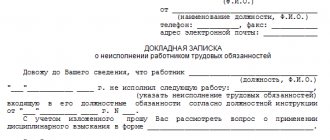14.06.2019
0
77
4 min.
Disciplinary action in the form of dismissal is applied as a punishment to an employee for gross violation of the company’s labor rules and relevant articles of the law. There are softer measures designed to restore order when an employee fulfills his official obligations as provided for in the clauses of the contract, regulations or charter of the enterprise.
There are many reasons for imposing strict types of disciplinary action, these include regular failure to fulfill assigned duties or gross misconduct, such as truancy or appearing drunk. For them, the employer has the right to dismiss the subordinate from service, impose a fine and make an entry in the book, indicating the law under which the punishment was imposed. Within the framework of this article, the questions will be considered: is dismissal a disciplinary sanction, for which it can be received, and the procedure for judicial appeal in the event of illegal application of this measure.
Which article of the Labor Code of the Russian Federation is supported by
Two articles of the Labor Code of the Russian Federation regulate the question of whether it is possible to apply dismissal as a disciplinary sanction.
Article 81 of the Labor Code of the Russian Federation mentions several reasons for dismissal on this occasion. It also indicates situations where removal from office for a single offense is possible.
Article 192 of the Labor Code of the Russian Federation states that dismissal is a type of disciplinary sanction .
Grounds for dismissal for misconduct
Termination of a contract for a single violation can only be for a serious offense prescribed in the Labor Code of the Russian Federation . The employer must have documentary evidence of the violation, otherwise the employee has the right to appeal the dismissal through the courts.
Gross violations
There are several gross violations for which the employer has the right to use dismissal as a punishment. These include:
- Absenteeism is an employee’s absence from work without good reason.
Moreover, valid reasons must be confirmed by relevant documents .
Reference! In some cases, an employment contract or a regulatory act of an institution may not indicate a specific workplace for an employee. In this case, they rely on where he should be during working hours in accordance with his duties.
Absenteeism is also considered to be willful departure on main or additional leave and willful use of time off.
- The state of any toxic intoxication.
In this case, the employee must be subjected to a medical examination, otherwise, without a strong evidence base, removal from office may be considered illegal. An employee should not be intoxicated at the workplace or on any other territory owned by the company (Article 81 of the Labor Code of the Russian Federation).
- Disclosure of secrets protected by law.
If the employment contract contains a list of information prohibited from disclosure and the employee has signed a non-disclosure act and a receipt for familiarization with classified information, he can also be fired immediately.
- Theft in the workplace.
An employee can be fired for intentionally breaking someone else’s property, embezzlement, theft, even in small amounts. In this case, the illegal action must be proven either by a body that has the authority to impose administrative penalties, or by a court verdict that has legal force (Article 81 of the Labor Code of the Russian Federation, paragraph 6, subparagraph “d”).
- Loss of trust due to the commission of illegal acts by an employee responsible for material assets (Article 81 of the Labor Code of the Russian Federation, clause 7).
- An immoral act committed by an employee engaged in educational activities , regardless of whether it occurred during working hours or not.
- Making an untenable decision by the chief accountant, the head of the enterprise or his deputy, which subsequently led to damage to the property of the enterprise or organization.
- Serious violation of labor duties leading to property damage to the enterprise or harm to the health of employees.
Attention! All of the gross violations described above give the employer the freedom to apply disciplinary action in the form of dismissal. According to the law of the employer, when a serious offense is identified, whether to apply this punishment or not.
Violation of labor discipline
For less serious offenses, but of a regular nature, which can lead to dismissal:
- regular lateness;
- violation of safety rules without causing damage;
- non-compliance with work schedule;
- absences without good reason.
Violation of employment agreement and job description
In some cases, the employer may have claims against the employee due to poor performance of their work tasks or refusal to perform them at all . In this case, the following reasons may be grounds for dismissal:
- Refusal of mandatory medical examination.
- A marriage that occurred due to the fault of an employee.
- Poor performance of official functions.
- Delaying deadlines for completing a work task.
- Failure to comply with the established production norm;
- Provocative behavior.
- Refusal to follow orders from superiors.
Each of the above actions may be grounds for a reprimand. In itself, it cannot be a basis for dismissal, but only if the employee does not have a reprimand, penalty or reprimand outstanding within 1 year (Article 192 of the Labor Code of the Russian Federation).
Important! An employer cannot take disciplinary action against an employee for non-compliance with an employment contract if the latter was not notified of changes in its content in writing at least 60 days before they occurred (Article 74 of the Labor Code of the Russian Federation).
Failure to comply with labor protection requirements
For some professions and hazardous work, the law requires mandatory introductory and regular training. Familiarization is carried out by the employer under the obligatory signature of the employee.
In this case, failure to use protective or preventive measures during the performance of official functions , even if they did not result in damage to health or other serious consequences, is a serious offense . If a disciplinary sanction has not previously been applied to this employee, then only a reprimand can be issued (Article 193 of the Labor Code of the Russian Federation).
The law prohibits dismissing an employee who refuses to fulfill his job duties if he sees that his safety and labor protection are not ensured (Article 379 of the Labor Code of the Russian Federation).
Causing damage to the enterprise
The damage caused to the organization by an employee can be not only material, but also moral . Especially if it concerns the company's reputation. In this case, the violation will also be considered gross and sufficient for dismissal.
Damage is considered to be:
- intentional material and non-material harm;
- embezzlement or theft of material assets;
- disclosure of secret data (state or commercial).
To terminate an employment contract for the reasons described above, the employer must initiate an internal investigation or involve law enforcement agencies. This is necessary to collect sufficient evidence.
Through seeking to prosperity
Labor discipline is the key to a successful business.
This applies not only to achieving personal results, but also affects the prosperity of the company as a whole. Sloppy employees who are late for negotiations, look sloppy, let down counterparties and take it out on clients will not allow the implementation of even the most ideally verified plan by management. And good salaries, comfortable jobs and regular bonuses do not always motivate staff. More precisely, the carrot method is good, but not for the absolute majority.
There are few people who work properly on their own, fulfilling plans and without causing any complaints. They are non-confrontational and neat. At the same time, not because of possible “goodies” from the company, but just the way they are designed. Perfectionists or neat freaks by nature.
Even larger is the group of those who are subject solely to the whip in the form of disciplinary sanctions. Only the threat of punishment motivates them, if not to professional achievements, then at least tolerable compliance with job descriptions and local regulations of the enterprise.
Some do not value their place so much that they violate the “rules of conduct” and fail to fulfill their duties over and over again, accumulating penalties. The bosses of such employees ask themselves: after how many reprimands can an employee be fired?
Step-by-step punishment instructions
In case of violation of labor discipline, the employer must act in accordance with the instructions prescribed in the Labor Code of the Russian Federation. The slightest deviation from it can lead to a serious fine. In addition, this will help the employee challenge his dismissal in court.
Drawing up an act
Article 193 of the Labor Code of the Russian Federation provides for regulations for the application of disciplinary sanctions. A person who discovers a violation or is aware of it from other employees must verbally report it directly to the violator’s supervisor.
The boss draws up a written report containing the following information:
- Full name of the offender;
- position held ;
- information about the violation;
- exact time of the offense ;
- signatures of witnesses and the boss.
If there is other evidence, for example, video footage from surveillance cameras , then it is also attached to the act.
Employee's explanation
In any case, the employer is obliged to give the employee the opportunity to write an explanatory note . According to the law, the latter has 2 days to do this. If the offender refused to give an explanation for his misconduct, then the employer must draw up another report in the presence of at least two witnesses.
Issue of an order
If an employee refuses to provide an explanation for the misconduct, then dismissal for disciplinary action may be applied to him (Article 81 of the Labor Code of the Russian Federation).
According to Article 193 of the Labor Code of the Russian Federation, an order for disciplinary action is issued within 30 days from the moment the violation is discovered . The violator must be familiar with it within three days from the date of its preparation. After which he must sign it.
Contents of the order and date of termination of the contract
The law does not provide for mandatory content in disciplinary orders. Usually each company has its own sample. Most often, this type of document contains:
- serial number;
- basis for recovery;
- signature of the offender, witnesses and supervisor;
- date.
Reference! The employer is obliged to correctly formulate the basis for the penalty and take care to provide evidence of the violation. In case of termination of the employment contract, the date of its termination is indicated in the order of disciplinary violation.
Entry in the work book
If the dismissal is a consequence of a disciplinary sanction , then the employer is obliged to indicate its reason in the employee’s work book. It should also contain a reference to an article of the Labor Code of the Russian Federation.
The employer does not have the right to note other types of penalties in the work book; they must be contained only in the employee’s personal file.
How much time is given for punishment
If the punishment did not entail dismissal, then it will be considered fully repaid 1 year from the date of issue of the order . If the employer sees that the employee has realized his mistake, he can remove him ahead of schedule . To do this, he will need to issue 1 more order.
There are also time limits within which it will be impossible to punish an employee for an offense if it is discovered too late, that is, after 3 months from the date of occurrence .
The exception is penalties aimed at financially responsible employees. In this case, the employee can be punished within two years from the moment the offense was committed. The validity period is also 2 years.
What and how to choose
So, by what criteria and who chooses the type of recovery? In practice, everything depends on staffing levels. If there is a personnel officer, then he makes the initial choice, setting out his position in the draft of the relevant order. More often than not, this project is coordinated with a lawyer. But it happens that it is not the personnel officer, but the lawyer who is developing drafts of such orders. If there are none, then the decision is entirely up to the director.
In any case, all circumstances must be taken into account, as well as the explanations of the participants and witnesses of the incident, the characteristics of the person, his attitude to the performance of his duties before this episode, as well as the proportionality of the proposed disciplinary measures.









